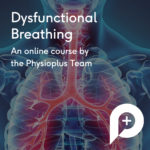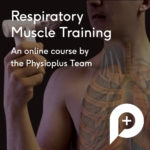At Physioplus we are committed to ensuring that our courses for our members are regularly revised and updated. The latest courses that need updating are the Respiratory Disorders and Respiratory Muscles Training Courses.
Research has shown that training to increase the strength and endurance of the respiratory muscles can improve many long-term health conditions such as back pain and falls. In these two revised and updated Physioplus courses, you will learn how to identify and evaluate breathing pattern disorders, as well as create a treatment plan that includes respiratory muscle training exercises. By putting what you learn in these courses into practice, your patients can unleash their physical performance potential.
This course was created by the Physioplus team, which consists of international physiotherapists who work in various fields. Hence, this course has information that is relevant to you no matter where you work from COVID-19 wards to pediatrics and the elderly to surgical wards. This course offers some clinical opportunities for everyone.
The updated courses
Dysfunctional breathing
 Dysfunctional breathing is defined as chronic or recurring changes in breathing patterns that cause significant discomfort in the airways and the airways. Hyperventilation syndrome is diagnosed in around 10 percent of people. However, many more people have subtle but clinically significant breathing pattern disorders (BPD). The symptoms of BPDs are varied and can mimic serious illnesses, including cardiovascular disease. They have also been linked to musculoskeletal disorders, including back pain and pelvic problems, and anxiety. An understanding of BPDs is therefore essential for physical therapists to ensure that we can effectively treat this condition.
Dysfunctional breathing is defined as chronic or recurring changes in breathing patterns that cause significant discomfort in the airways and the airways. Hyperventilation syndrome is diagnosed in around 10 percent of people. However, many more people have subtle but clinically significant breathing pattern disorders (BPD). The symptoms of BPDs are varied and can mimic serious illnesses, including cardiovascular disease. They have also been linked to musculoskeletal disorders, including back pain and pelvic problems, and anxiety. An understanding of BPDs is therefore essential for physical therapists to ensure that we can effectively treat this condition.
Recognizing and treating respiratory disorders
Respiratory muscle training
 The respiratory muscle training (RMT) is a training method that aims to improve the function of the respiratory muscles through specific exercises. This type of exercise has wide-ranging benefits, from improving performance in athletes to improving function in patients with chronic conditions like COPD or heart failure. Since the respiratory muscles are also important for posture control and core stability, RMT can improve conditions such as back pain and reduce the risk of falls. Understanding this technique can therefore improve the practice of physical therapists from different backgrounds.
The respiratory muscle training (RMT) is a training method that aims to improve the function of the respiratory muscles through specific exercises. This type of exercise has wide-ranging benefits, from improving performance in athletes to improving function in patients with chronic conditions like COPD or heart failure. Since the respiratory muscles are also important for posture control and core stability, RMT can improve conditions such as back pain and reduce the risk of falls. Understanding this technique can therefore improve the practice of physical therapists from different backgrounds.
Strengthen the performance of your patient